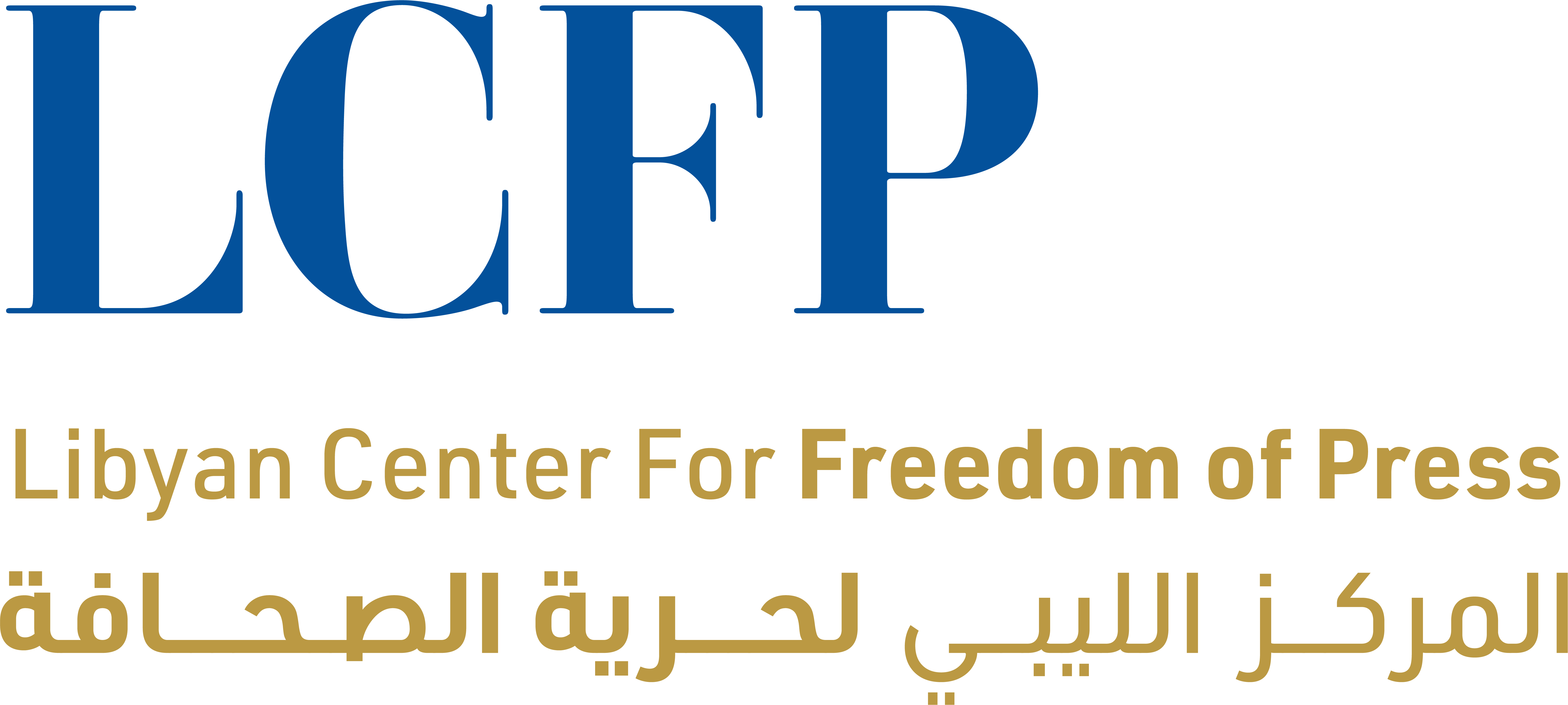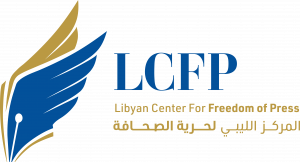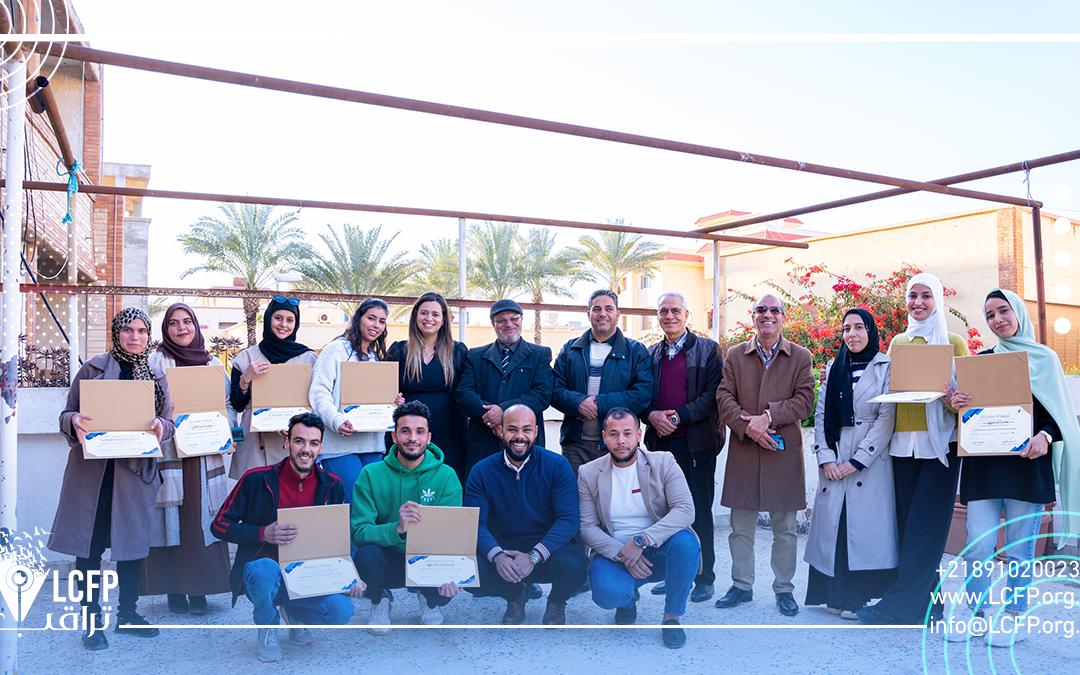
Feb 25, 2023
Tripoli _ February 15
The LCFP team of monitors completed today, Wednesday, intensive training on media monitoring techniques for political pluralism in the Libyan media. The training lasted 15 days, with the participation of 9 trainees at the Center’s headquarters in Tripoli. The trainer was the expert and researcher in the field of media monitoring, Fatima Al-Lawati. The first outcome of the training will be the issuance of the first research report on political pluralism in Libyan media. It is in the framework of the structural and legal reform program for the press and media sector in Libya
The Chairman and members of the Board of Directors of the Libyan Center for Freedom of Press, and the Dean of the Faculty of Information at the University of Tripoli, Dr. Khaled Ghulam, participated in the distribution of training certificates to the trainees. The trainees will continue their work until the middle of next March, in order to monitor and analyze the content of 9 Libyan “state and private” media outlets. They will monitor 500 TV hours
Prof. Dr. Mohamed Al-Asfar, Chairman of LCFP Board of Directors, said that these trainings are the first step towards more media research on how to analyse the content, assess the appearance of political figures in Libyan media and evaluate the respect of equal opportunities among all Libyan parties. That is the basis for ensuring fair representation for all through media funded by the state or by private entities
It is noteworthy that media monitoring comes within the project of media coverage of the elections in the context of sensitive situations. The Project is part of the LCFP preparations for the upcoming national elections. The Project’s outcome is the issuance of the first research report on political pluralism in Libyan media
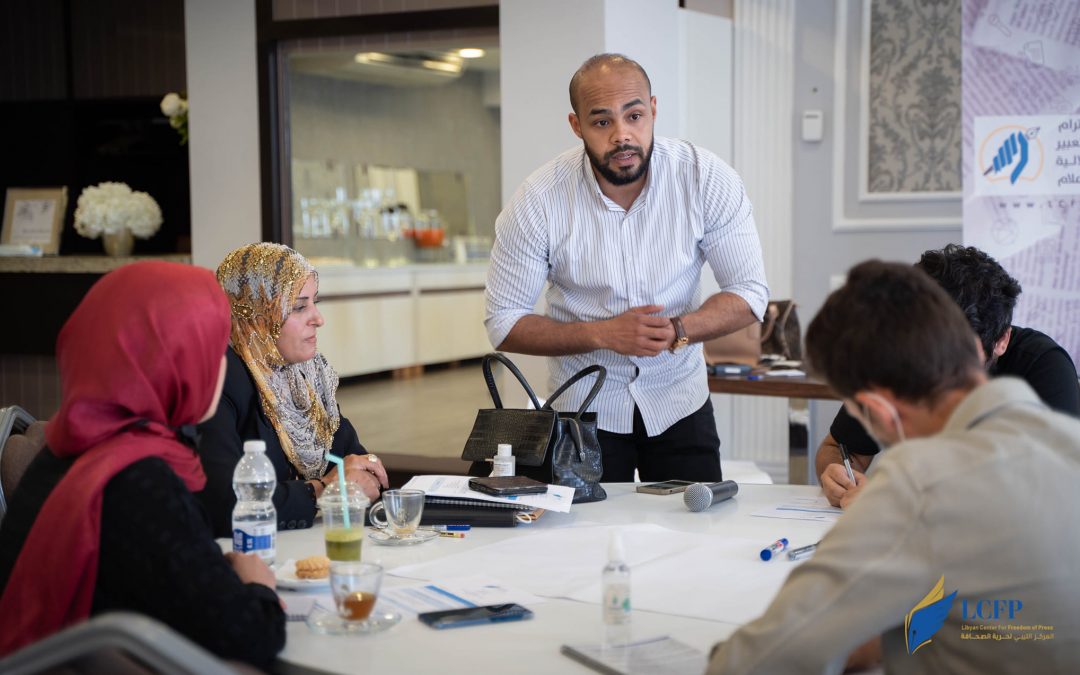
Jan 5, 2023
Brief Annual Report
Tripoli_ January 5th
2022 has been a quick year. We are on the verge of the new year 2023, and about to celebrate our tenth year at the Libyan Center for Freedom of Press. However, there are still many actions and missions that must be done to move forward along with a team that is betting on success and making impact. We work in an environment characterized by difficult challenges and increasing professional pressures on all of us, especially those working in Libyan civil society in the light of the fragility of the legal system and the increasing security risks and their complexity
Perhaps the most prominent feature of the past year is the significant shrinkage in the space for civil society work due to the arbitrary measures taken by the Commission of Civil Society in the east and west. 2022 has also witnessed our resilience and steadfast rejection of many decisions of the Government of National Unity. The GNU describes those decisions as reformist while we consider them as selective and vindictive
During the year 2022, we focused on the internal development of our institution. We have endeavoured to modernize its policies and administrative and executive structure. We have also focussed on fine-tuning our vision in supporting freedom of expression, conducting real and radical reforms to strengthen the independence of the Libyan press and the media sector. We have been pushing forward to promote the economic and social rights of journalists who continue to face exceptional critical circumstances that impose strict censorship on their work
Our ongoing efforts to combat hate speech and disinformation, which have been launched since 2017, may still find wide national interaction and resonance. These efforts have culminated in a painstaking and more professional work on Falso platform to monitor hate speech and fake news.
2022 was a year filled with discussions, orientation sessions, and round tables of dialogue that targeted several segments of Libyan society, such as academics, human rights defenders, judges, prosecutors, lawyers, leaders of political parties, and candidates for the stalled presidential and parliamentary elections along with journalists and fact-checkers. It all aimed at drawing the features of national vision to serve as the basis of a new national legislation that sets the path for a new era for media related freedoms and creates a break with the vulsive guided media discourse and the state of fragmentation
We believe that open dialogue on a common ground has enabled us to have live and direct discussions with 250 Libyans from several segments of the Libyan society, in 8 major Libyan cities
Many of the GNU decisions are efforts to control and orient the public and private media. Government Decision No. 811 of 2022 to regulate radio and television broadcasting best illustrates this as media lacks the most basic elements of “independence and pluralism”. The decision prompted us to go to the Administrative Department of the Court of Appeal to challenge the decision. Our Appeal is based on the illegality of the government’s decision as it contradicts with Libya’s obligations to international agreements and with the constitutional declaration in the country. Indeed, the government is trying to impose exorbitant fees without any services provided in a vindictive and selective manner of handling licensing and broadcasting
We have widened our training programs. We invested many years of training on physical and digital safety provided to more than 400 Libyan journalists, bloggers and activists. In addition, we have training our beneficiaries on journalism and human rights as we have trained more than 225 Libyan journalists in 5 Libyan cities. Now, we launched training programs on media coverage of the elections in the context of sensitive situations for 45 Libyan journalists so far. On the other hand, our media education and fact-checking programs target university students
Over the past year, our team has produced several visual and audio materials, press releases and statements, within the framework of expanding and involving the broad and general public in our work and programs. This helps us in terms of opening up and building a bridge for communication with the general public
Finally, 2022 remains the year of security risks within the context of fragility of the legal framework of our work and efforts, as well as the continuous professional pressure. Yet, we will inevitably overcome all obstacles
Mohamed Al-Najem
The Chief Executive Officer
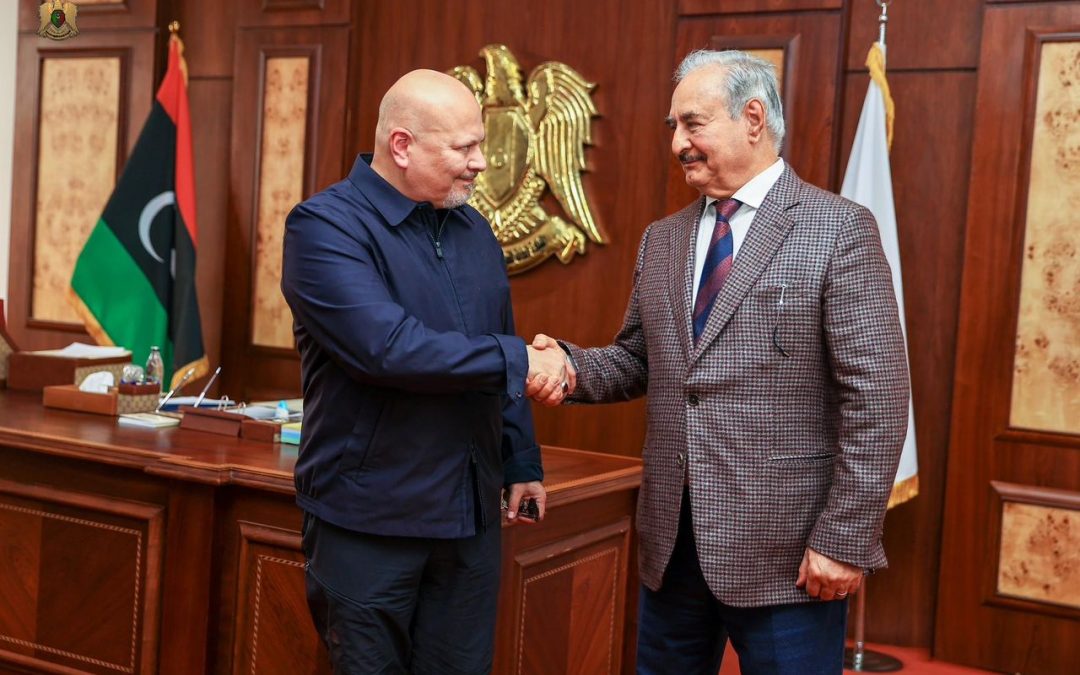
Nov 10, 2022
In response to the Prosecutor of the International Criminal Court (the ICC or the Court) Karim Khan’s meeting with commander of self-styled armed group the Libyan Arab Armed Forces (LAAF) Khalifa Haftar at his office in Benghazi, Libyan civil society demand an apology and accountability for the Prosecutor’s actions
Khalifa Haftar is allegedly responsible for a plethora of serious international crimes and human rights violations. He has been charged with war crimes by a US court, is subject to a criminal investigation in France for allegations of torture, and has previously refused to cooperate with the ICC by failing to handover a wanted suspect. In his briefing to the United Nations Security Council in April 2022, Karim Khan announced that his Office had collected a range of evidence that the LAAF committed serious international crimes, including “indiscriminate airstrikes and shelling of civilian areas; arbitrary abduction; detention and torture of civilians; extrajudicial killings; enforced disappearances; and pillaging of civilian property.” Only last week, Haftar announced another planned military attack on Tripoli
The Prosecutor’s meeting with Haftar is highly offensive not just to the victims of Haftar’s alleged crimes, but to all victims and affected communities of crimes that the Court was established to investigate and prosecute. It is made worse by the fact that this meeting took place shortly after the Prosecutor met with survivor groups and the families of victims in the city of Tarhouna, formerly held by Haftar and the site of multiple mass graves under investigation by the ICC and the UN Independent Fact-Finding Mission on Libya
The insensitivity of the Prosecutor to the situation on the ground is a shocking insult to human rights defenders and civil society actors who have been working tirelessly, to the detriment of their own safety and security, to support the work of the Court
“This meeting has shaken our confidence in the court’s ability to deliver justice and it has confirmed that it is politicised! How can the OTP meet with a torturer in his office? We were expecting arrest warrants for those responsible for war crimes in Libya, not shaking hands and exchanging smiles.” said Ali Alasbali, President of Libyan Crimes Watch and former detainee in Gernada prison under LAAF control
Karim Khan’s willingness to openly meet with the head of an armed group tussling for political and international legitimacy seriously undermines the credibility of the Court, calling into question its impartiality and legitimacy to examine the situation in Libya. As a result, the trust of victims and all Libyans, and their willingness to collaborate with the Court, has been severely damaged. This will ultimately impede the ability of the Court to investigate crimes committed
“It is saddening to see the guardians of international justice and those entrusted with it shaking the hands of the most responsible for war crimes and crimes against humanity instead of holding them accountable, is a frustrating and disappointing spectacle for victims and human rights defenders,” said another human rights defender who works closely with victims in Tarhouna
The undersigned Libyan organisations demand an apology from the ICC and the Prosecutor to victims and civil society in Libya. We also demand the ICC to investigate the actions of Karim Khan and ensure that he is held accountable through necessary disciplinary action.
:Signed by
Lawyers for Justice in Libya (LFJL)
Libya Crimes Watch
Tamazigh Women’s Movement
(LCFP)Libyan Center for Freedom of Press
صفحة القيادة العامة للقوات المسلحة العربية الليبية-الرسمية على الفيس بوك :image source
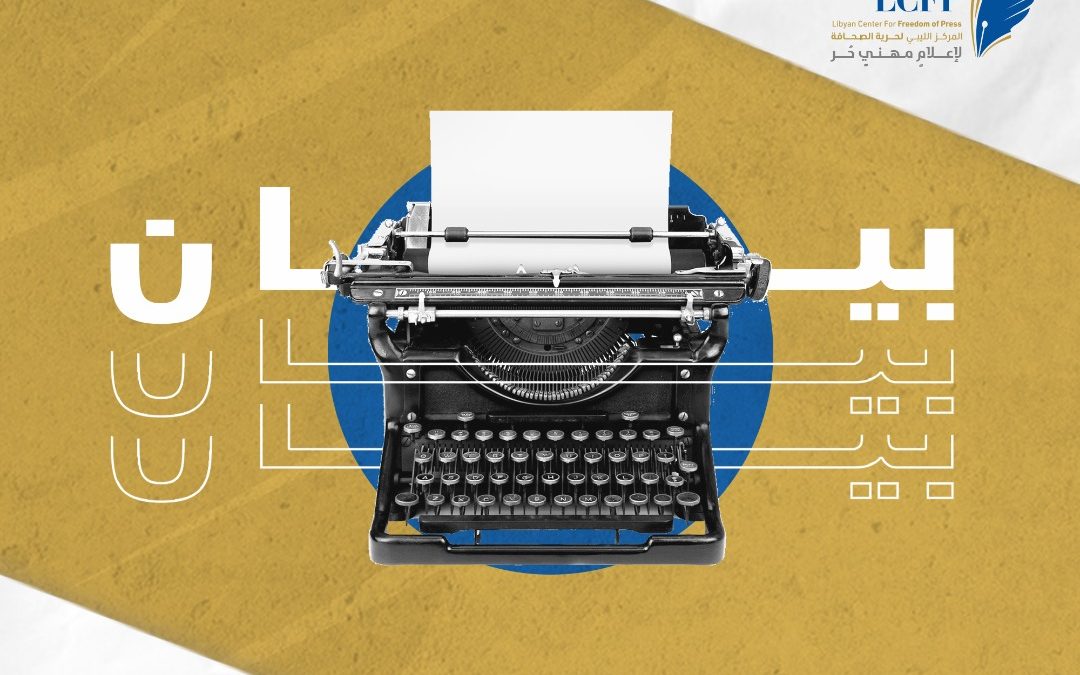
Nov 10, 2021
The undersigned organizations call upon Libyan authorities to rescind the cybercrime law recently adopted by the Libyan House of Representatives. The law would severely restrict freedom of expression, curtail press freedom, and legalize mass surveillance of speech online. Additionally, the law allows for warrantless blocking of websites and content
During the plenary session held on October 26, 2021, the Libyan House of Representatives ratified the Anti-Cybercrime Law. The vote comes at a pivotal moment for Libya with the presidential elections scheduled for December 24, 2021. In order to ensure these elections are free, fair, and transparent, it is imperative to guarantee freedom of opinion and expression as well as freedom of press, both offline and online
The draft bill was quickly passed, only one day after it was added to the parliament’s agenda and without public consultation with Libyan civil society, human rights defenders, or experts. This has prompted the undersigned organizations to examine the version available on social media, which was leaked by Members of Parliament and experts in the digital field
Broad terminology that contravenes international human rights standards
The new Anti-Cybercrime Law stipulates a myriad of overbroad and ambiguous terms that would give the Libyan judicial authorities an extensive discretionary power to restrict online freedom of expression. Article 4 stipulates that the use of the internet and new technologies is considered “legal” provided that “public order and morality” are respected. Hence, any use that violates these ambiguous concepts can be deemed illegal. According to Article 37, “whoever spreads a rumor or publishes information or data that threaten security or public safety in Libya or any other country,” shall be imprisoned for a period of up to fifteen years in addition to a heavy fine of no less than ten thousand Libyan Dinars. We warn against the danger of using this article to target and punish journalists, whistleblowers, human rights defenders, and other internet users. This article can also be used to criminalize the publication and sharing of any content that documents human rights violations, opposes public policies in Libya, or any other information of public interest. Notably, the Libyan authorities and militias have used “violation to public order and morality” as a pretext to target, imprison, torture, and kill journalists and human rights defenders
Furthermore, danger of this repressive legislation lies in Article 35, which provides for the imprisonment of “anyone who is aware of the commission or attempted commission of any of the crimes stipulated in this law” even though it includes phrases having a general and broad meaning
Such broad and ambiguously drafted articles are in violation of international human rights standards and Article 19 of the International Covenant on Civil and Political Rights (ICCPR). As stated by the U.N. Human Rights Committee in their General Comment No. 34, “a norm, to be characterized as a ‘law’, must be formulated with sufficient precision to enable an individual to regulate his or her conduct accordingly.” Any restriction of the right to opinion and expression for reasons related to either respect for the rights of others or their reputations, or to protect national security, public order, public health, or morals must be provided by law and subject to rigorous tests to meet the requirements of necessity and proportionality. This is also consistent with Libya’s national laws. Article 14 of the Libyan Constitutional Declaration of 2011 stipulates that the State shall guarantee freedom of opinion and expression as well as the freedom of press and publication
Measures that threaten the freedom of expression, publication, and press
Articles 13 and 47 of this new legislation, related to “interference and interception” and “unlawful wiretapping” respectively, could justify impeaching journalists for accessing information or communicating with whistleblowers in order to share information of public interest. This is inconsistent with paragraph 2 of Article 19 of ICCPR, which states that “[e]veryone shall have the right to freedom of expression; this right shall include freedom to seek, receive, and impart information and ideas of all kinds, regardless of frontiers, either orally, in writing or in print, in the form of art, or through any other media of his choice.” It also contravenes paragraph 3 of the General Comment No. 34 stipulating that “freedom of expression is a necessary condition for the realization of the principles of transparency and accountability that are, in turn, essential for the promotion and protection of human rights,” as well as paragraph 30 stipulating that “It is not compatible with paragraph 3, for instance, to invoke such laws to suppress or withhold from the public information of legitimate public interest that does not harm national security or to prosecute journalists, researchers, environmental activists, human rights defenders, or others, for having disseminated such information.”
Article 21 of the Anti-Cybercrime Law also criminalizes and punishes with imprisonment for a period of no less than one year any act of “combining or mixing someone’s picture or voice, without their written or online consent, by using the internet or any other digital means with the intent of harming others.” The article does not carve exceptions with regards to public or political figures, and therefore may inadequately restrict freedom of expression in Libya. In this context, it is noteworthy to point out the Human Rights Committee’s affirmation within the General Comment No. 34 stating that “all public figures, including those exercising the highest political authority such as heads of state and government, are legitimately subject to criticism,” and that “the mere fact that forms of expression are considered to be insulting to a public figure is not sufficient to justify the imposition of penalties.”
Permitting mass surveillance and blocking of websites and content
Article 7 of the Anti-Cybercrime Law permits the Libyan authorities to monitor everything published on social media “and any other technical platform,” and to enable the National Information Security and Safety Authority (NISSA), an administrative and technical governmental authority in Libya, to block websites and content without judicial orders if they provoke “racial or regional slurs and extremist religious or denominational ideologies that undermine the security and stability of the society.” NISSA can also censor and block access to all websites and pages containing materials that are “contrary to public morality” under article 8 of the law
A threat to citizens’ digital safety and security
The Anti-Cybercrime Law criminalizes the use of encryption tools. Article 9 stipulates that “no individual or entity shall produce, possess, provide, market, manufacture, import, or export encryption tools without NISSA’s permission or authorization,” which jeopardizes digital safety and security of Libyan citizens and infringe upon their right to protect their privacy, personal data, and online communication away from authorities’ control
Based on all of the above, the undersigned civil society organizations call on the Libyan authorities to:
- Immediately repeal and not apply this law;
- Draft a new law in line with international human rights standards and Libya’s international commitments; and
- Adopt the principle of dialogue and consultation with Libyan civil society and the relevant international organizations when drafting any bills related to fundamental rights and freedoms in Libya, including the freedom of publication and press
Signatory organizations:
Access Now
Reporters without Borders (RSF)
MENA Rights Group
Hexa Connection
Electronic Frontier Foundation
ELBIRO Media Foundation
SMEX
BYTE Organization
Annir Platform
Libya Organization for Culture and Media
ImpACT International for Human Rights Policies
Euro-Mediterranean Human Rights Monitor
Phenomena for Media & Research
Lawyers for Justice in Libya
Youth Gathering For Tawergha Organisation
Independent Organization for Human Rights
Libyan Center for Freedom Of Press
Libyan Crimes Watch
Moomken Organization For Awareness and Media
Aswat Media Network
Tanweer Movement
Yes We Can Organization
Cairo Institute for Human Rights Studies (CIHRS)
Libyan Women’s Platform for Peace
Jurists Without Chains
Al-Aman Organisation Against Racial Discrimination
Libyan Organization for Legal Aid
Belady Foundation for Human Rights
Adala for All
Libyan Voluntary Group for Monitoring Human Rights Violations
Defender Center for Human Rights (DCHR))
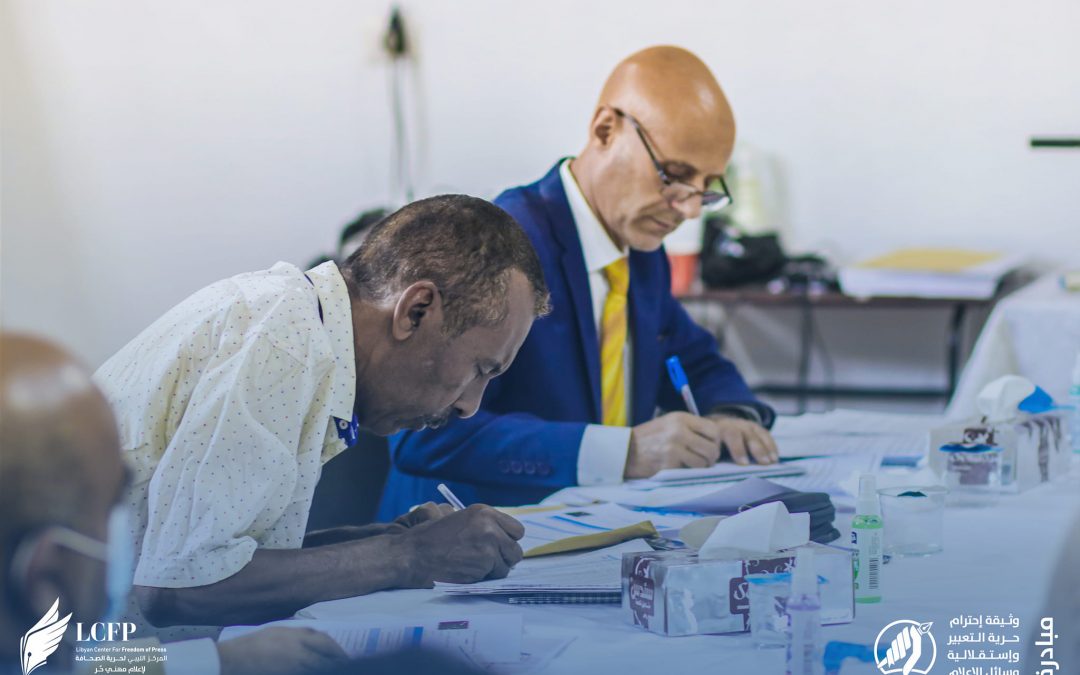
Oct 14, 2021
Sebha/October 11
A new discussion session was held in Sebha city within the National Initiative for the drafting of a “document respecting freedom of expression and the independence of media institutions”. Twenty-eight journalists, television correspondents, academics, lawyers, activists and media professionals took part in the Session. They discussed the need for media practices to be based on national legislations that promote independence and liberty
The participants agreed that it is necessary to draft a law to establish the High Media Council. It should be independent from the executive government. It should be responsible for managing and reorganizing the media sector and public media institutions. It should also reorganize radio and television broadcast, grant licenses to private media institutions and oblige them to disclose their funding sources, and make them respect the regulations and standards the National Media Foundation sets. The National Media Foundation is the highest independent authority. Its role is regulation. The members of its board of directors have the necessary expertise
The participants focused on the need to protect reputation and privacy. It is necessary according to them, to set executive regulations to ensure that media institutions are not involved in spreading rumors and biased news that harm the reputation of others. In addition, the general sanction procedures related to publishing issues should be reformed. The participants agreed that respect should prevail between political actors. Freedom of expression is a sacred right that is a part of the national constants. However, it should not threaten civil peace, public health or public order. Government officials will be bound to disclose information through the ratification of the law on access to information by the coming legislative authority
The participants also highlighted the need to monitor and oversee press and digital content. It is necessary to focus on combating disinformation, hate speech, rumors and spreading of destructive ideas on social media. Internet should be regulated in order to enhance its position as a free digital space
The participants find it imperative to develop educational curricula for Libyan media colleges, to develop media laboratories and to enhance their technical capacities. They also called on the candidates to the upcoming national elections to pledge to work with civil society and journalists on draft laws related to press and publishing. They also have to work on the law of the National Media Foundation, which is being prepared by experts in the field of media and law in the National Committee for reviewing media draft laws administered by the Libyan Organization for Independent Media
The participants emphasized the need for legal and institutional support that goes in line with the challenges facing the Libyan state. It is necessary to respect freedom of expression and independence of media, establishing a national project and unifying media discourse under the umbrella of professionalism, objectivity, quality and efficiency. It is also necessary to have legal texts that explicitly provide for the protection of media professionals
At the end, the participants stressed the need to respect the cultures and characteristics of the Libyan society components. They all have the right to broadcast in their own language and to convey their voice to the Libyans

